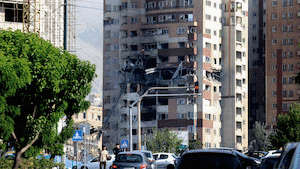Countries around the world reacted with alarm to Israel's strikes on Iranian nuclear facilities on Friday, calling for restraint and dialogue to resolve the decades-long dispute over Tehran's nuclear programme.
The US, which said it was not involved in the attacks, warned Tehran against hitting American targets in any response.
“We are not involved in strikes against Iran and our top priority is protecting American forces in the region,” said Secretary of State Marco Rubio. “Let me be clear: Iran should not target US interests or personnel.”
President Donald Trump was expected to attend a meeting of his National Security Council on Friday to discuss the conflict with top advisers. He had previously cautioned Israel against an attack during ongoing negotiations between Washington and Tehran over the nuclear programme.
He urged Iran to reach an agreement with Washington "before it is too late" in a post on his Truth Social platform.
"Iran must make a deal, before there is nothing left, and save what was once known as the Iranian Empire," he said. "Certain Iranian hardliners spoke bravely, but they didn’t know what was about to happen. They are all dead now, and it will only get worse!"
In the Gulf, the UAE criticised the Israeli attacks and called for “utmost self-restraint and judgment” to mitigate risks and prevent any expansion of the conflict. The Foreign Ministry said adhering to international law and respecting the sovereignty of states was key to resolving disputes.
Saudi Arabia condemned the strikes and labelled them “blatant Israeli aggressions”. Riyadh said they “undermine [Iran's] sovereignty and security and constitute a clear violation of international laws and norms”.
Oman, which has been mediating the weeks of US-Iran talks, called the attacks “dangerous” and “reckless”.
It said they were a “flagrant violation of the UN Charter, the principles of international law”, adding that they would further destabilise the region.
“The Sultanate of Oman holds Israel responsible for this escalation and its consequences, and calls upon the international community to adopt a firm and unequivocal stance to halt this dangerous course of action.”
Lebanon, home to the Iran-backed militia Hezbollah which last year fought a months-long war with Israel, also denounced the strikes. President Joseph Aoun warned they undermine all efforts and initiatives aimed at preserving regional stability.
He called on the international community to act quickly to prevent Israel from “achieving its objectives”.
Hamas, which is backed by Iran, condemned the Israeli bombing and warned it could further destabilise the region. "Iran is paying the price for its steadfast stance in support of Palestine and its resistance," it said.
The Iran-backed Houthi rebels in Yemen also criticised the attacks and said Iran has a right to its nuclear programme, according to a statement from their political bureau posted on Telegram.
Turkey, which has been fiercely critical of Israel's war in Gaza, called the Israeli operation a “provocation” and said it was intended to further destabilise the Middle East.
“The fact that the attacks took place at a time when negotiations on Iran's nuclear programme are intensifying shows that the Netanyahu government does not want any issue to be resolved through diplomatic means and does not hesitate to risk regional stability and global peace in line with its own interests,” the Foreign Ministry said.
Turkey shares a land border with Iran, and while the countries are generally considered to have competing aims in the region, they are linked by close trade ties.
Neighbouring Iraq called on the UN Security Council "to convene immediately and take decisive and concrete measures to deter this aggression". It said the "international community must not remain a bystander to this flagrant violation of international law”.
Britain’s Prime Minister Keir Starmer called for restraint. “Escalation serves no one in the region,” he said. “Stability in the Middle East must be the priority and we are engaging partners to de-escalate. Now is the time for restraint, calm and a return to diplomacy.”
French Foreign Minister Jean-Noel Barrot urged de-escalation but acknowledged “serious concerns” over Iran’s nuclear programme and reaffirmed Israel’s right to defend itself against “any attack”.
“We call on all sides to exercise restraint and avoid any escalation that could undermine regional stability,” he said.
UN Secretary General Antonio Guterres said the Middle East could not afford any more war. “The Secretary General asks both sides to show maximum restraint, avoiding at all costs a descent into deeper conflict, a situation that the region can hardly afford,” a statement said.
Rafael Grossi, head of the UN's nuclear watchdog the International Atomic Energy Agency, said "nuclear facilities must never be attacked, regardless of the context or circumstances”.
Countries further afield also reacted with concern, with Japanese Foreign Minister Takeshi Iwaya “strongly” condemning the strikes and calling for restraint. “Peace and stability in the Middle East region are extremely important to Japan,” he said.
Australia's Foreign Minister Penny Wong said she was “alarmed” at the attack. “This risks further destabilising a region that is already volatile,” she said. “We urge the parties to prioritise dialogue and diplomacy.”
China said it was “deeply concerned” and condemned “violations” of Iran's sovereignty. Beijing has close ties with Tehran as its largest commercial partner and the main buyer of its oil.
“The sudden escalation of the regional situation does not serve the interests of any party,” said Foreign Ministry spokesman Lin Jian.
In Israel, Prime Minister Benjamin Netanyahu called the attacks a “decisive moment in Israel's history” and said the military operation against Iran would continue for days.
Tehran vowed to retaliate. Supreme leader Ayatollah Ali Khamenei said Israel should be prepared for a “bitter, painful fate”.
“By God’s grace, the powerful arm of the Islamic Republic’s armed forces won’t let them go unpunished,” he said.


